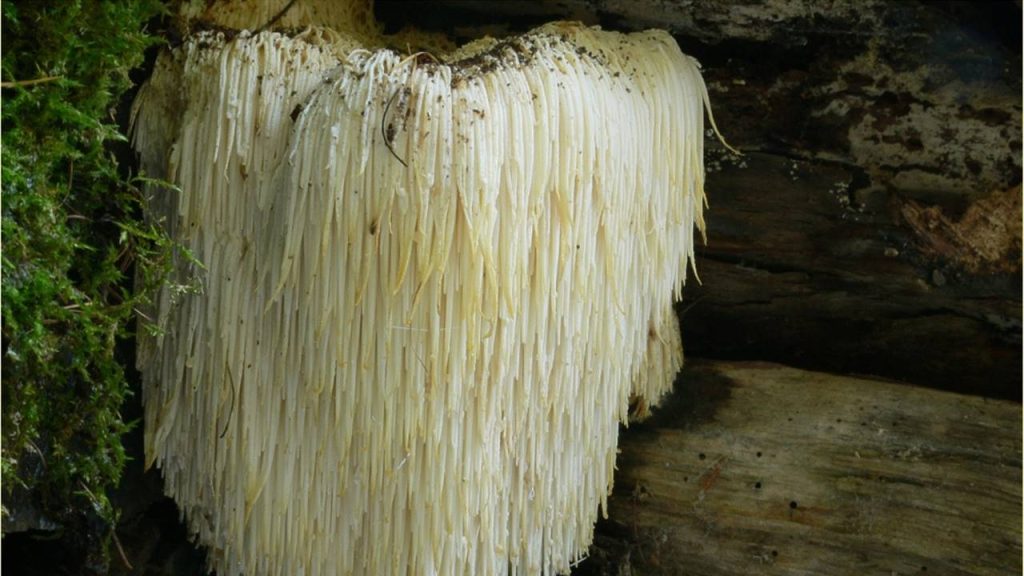New studies show that the lion’s mane mushroom, which has long been used in traditional Chinese medicine, stimulates the growth of brain cells, protects them and can improve memory.

The edible lion’s mane mushroom (Hericium erinaceus) grows on dead wood. Not only is its appearance unique, so are its healthy properties, especially its unique ability to repair neurons and protect memory.
WHY LION’S MANE MUSHROOM IMPROVES MEMORY
Myelin is a sheet structure that surrounds the axons of neurons and accelerates the transmission of electrical signals. That it is in good condition is, therefore, essential for neurons to allow us to develop motor skills and intellectual skills.
The consequences of damage to the myelin sheath are manifested in diseases such as multiple sclerosis, Parkinson’s, Alzheimer’s and senile dementia. In all these diseases there is a lack of regeneration of the myelin sheath of neurons.
In the case of Alzheimer’s, the deterioration of the myelin layer is accompanied by the formation of so-called beta-amyloid plaques, which hinder communication between neurons and can even kill them.
Well, the lion’s mane fungus, through its effect on myelin, mitigates the effects of these diseases and can even improve cognitive abilities, such as learning and memory, in healthy people. In addition, regular intake keeps the circulatory system in good condition and prevents cerebral infarction.
HOW DOES THE FUNGUS DO THAT?
A recent study, conducted at the University of Queensland (Australia), has shown that the active ingredients present in lion’s mane (hericenones and erinazin) can stimulate the generation of neurons and communication between them in laboratory cultures, which could improve memory. The authors believe that lion’s mane could be used to protect and treat Alzheimer’s disease.
According to Professor Frederic Meunier, from the Queensland Brain Institute, the extract of the fungus and its active compounds greatly increase the size of growth cones, which are important for brain cells to sense their environment and establish new connections with other neurons in the brain. The researchers explain that the fungus has demonstrated its ability to stimulate “nerve growth factor,” which promotes the synthesis of new neurons and the construction of the myelin sheath.
In addition, regardless of the effect on the myelin sheath, the fungus protects nerve cells from death by accumulation of beta-amyloid plaques and other stressors through a substance called dilinoleoyl-phosphatidyl-ethanolamine.
Previous studies had already tested the effect of lion’s mane on intellectual abilities. For example, a double-blind, placebo-controlled study showed that participants with mild cognitive impairment who received mushroom powder capsules for 16 weeks showed significantly improved mental abilities.
HOW TO TAKE LION’S MANE TO PREVENT MOMORIA LOSS
Lion’s mane can be used preventively to prevent the degeneration of neurons and to improve memory and learning ability.
WHAT IS THE RECOMMENDED DOSAGE?
According to studies, the daily intake of 3 to 5 grams of the dried mushroom is sufficient to increase NGF. Therefore, this mushroom not only helps people suffering from neurological disorders, but can also prevent and even reverse age-related cognitive decline.
Unlike most drugs prescribed by the pharmaceutical industry for cognitive function, lion’s mane produces no known side effects. It can be taken every day without any risk of adverse consequences.
LION’S MANE IN THE KITCHEN
Lion’s mane mushroom can be enjoyed fresh and cooked or through the powdered extract. Many people describe its taste as seafood-like and it is often compared to crab or lobster.
It can be cooked and served in dishes such as risotto, pasta or soup. The powder form can be mixed with hot water, tea, coffee, a smoothie or other beverages. It can also be added to soups, stews or sauces.
OTHER PROPERTIES OF LION’S MANE MUSHROOM
Aside from the amazing effects on the brain, the fungus can do much more.
REDUCES INFLAMMATION OF THE DIGESTIVE SYSTEM
In traditional Chinese medicine, it is used for all sorts of inflammatory stomach and intestinal problems, such as ulcerative colitis and Crohn’s disease.
Lion’s mane promotes the regeneration of damaged mucous membranes and regulates acid production.
In addition, erinacines in particular also appear to inhibit the growth of Helicobacter pylori bacteria, linked to ulcers and stomach cancer, and of yeasts such as Candida albicans in the gut that are involved in a variety of diseases, including the development of gastric ulcers and gastric cancer.
BOOSTS IMMUNITY
The fungus also has a strengthening effect on the immune system, especially when there is an immunodeficiency, thanks to its polysaccharides and polypeptides.
There is evidence that hericennones and erinazines stimulate the production of immune cells.



